名词性从句的翻译
名词性从句的翻译

2) 以it作形式宾语的宾语从句 一般按原句顺序翻译,it可不译出
I
made it clear to them that they must hand in their papers before 10 o’clock in the morning. 我明确地告诉他们,论文必须在上午十点之 前交。 Anyhow, old chap, I owe it to you that I am here. 不管怎么说,老伙计,我现在还能站在这儿, 全靠你。
2) 译为类似定语的结构或独立句
But
I knew I couldn’t trust him. There was the possibility that he was a political swindler. 但我知道不能轻信他。他是政治骗子这 种可能性还是存在的。 It does not alter the fact that he is the man responsible for the delay. 迟延应由他负责,这个事实是改变不了 的。
同位语从句
保持原本的语序 译为类似定语的结构或独成一句 加入冒号、破折号和“这样”、
“这一”、“即”等字眼 改变原文的同位语结构,用汉语 的无主句或其他方式译出
1) 保持原本的语序
He
expressed the hope that he would come over to visit China again. 他表示希望能再来中国访问。 As an obedient son, he had accepted his father’s decision that he was to be a doctor, though the prospect didn’t interest him at all. 作为一个孝顺儿子,他接受了父亲的决 定,去当医生,虽然他对这样的前途毫 无兴趣可言。
名词性从句翻译
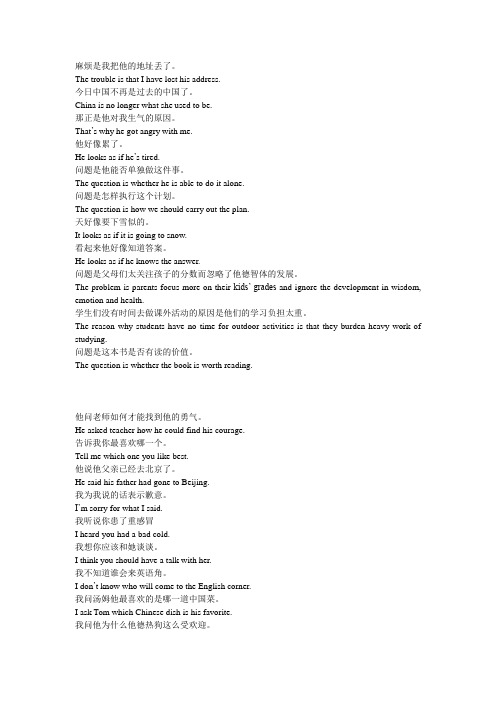
麻烦是我把他的地址丢了。
The trouble is that I have lost his address.今日中国不再是过去的中国了。
China is no longer what she used to be.那正是他对我生气的原因。
That’s why he got angry with me.他好像累了。
He looks as if he’s tired.问题是他能否单独做这件事。
The question is whether he is able to do it alone.问题是怎样执行这个计划。
The question is how we should carry out the plan.天好像要下雪似的。
It looks as if it is going to snow.看起来他好像知道答案。
He looks as if he knows the answer.问题是父母们太关注孩子的分数而忽略了他德智体的发展。
The problem is parents focus more on their kids’ grades and ignore the development in wisdom, emotion and health.学生们没有时间去做课外活动的原因是他们的学习负担太重。
The reason why students have no time for outdoor activities is that they burden heavy work of studying.问题是这本书是否有读的价值。
The question is whether the book is worth reading.他问老师如何才能找到他的勇气。
He asked teacher how he could find his courage.告诉我你最喜欢哪一个。
Tell me which one you like best.他说他父亲已经去北京了。
名词性从句汉译英
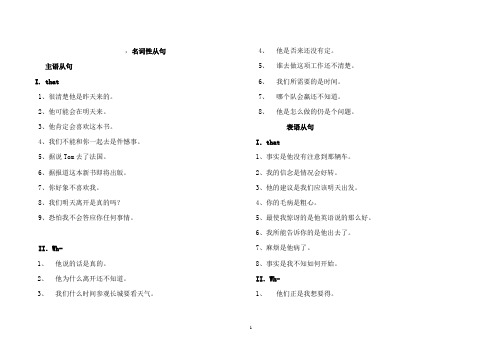
,名词性从句主语从句I. that1、很清楚他是昨天来的。
2、他可能会在明天来。
3、他肯定会喜欢这本书。
4、我们不能和你一起去是件憾事。
5、据说Tom去了法国。
6、据报道这本新书即将出版。
7、你好象不喜欢我。
8、我们明天离开是真的吗?9、恐怕我不会答应你任何事情。
II.Wh-1、他说的话是真的。
2、他为什么离开还不知道。
3、我们什么时间参观长城要看天气。
4、他是否来还没有定。
5、谁去做这项工作还不清楚。
6、我们所需要的是时间。
7、哪个队会赢还不知道。
8、他是怎么做的仍是个问题。
表语从句I.that1、事实是他没有注意到那辆车。
2、我的信念是情况会好转。
3、他的建议是我们应该明天出发。
4、你的毛病是粗心。
5、最使我惊讶的是他英语说的那么好。
6、我所能告诉你的是他出去了。
7、麻烦是他病了。
8、事实是我不知如何开始。
II.Wh-1、他们正是我想要得。
2、问题是它是否值得一做。
3、问提是我们该作些什么来帮助他。
4、问题是谁留下。
5、那就是他出生的地方。
6、我们就是这样分手的。
7、我是你正在找的那个人。
8、这就是我去那的原因同位语从句I.that1、我听到了我们队获胜的消息。
2、他在会上什么都没说的事实使我们惊讶。
3、他打算来的消息使我们高兴。
4、他已经下定学好英语的决心。
5、他当选的消息不是真的。
II.Wh-1、我不知道他什么时候来。
2、你不知道我多么着急。
3、很难回答你提出的我是如何做的问题。
4、我提出的如何邀请他的问题已经得到了解决。
5、你为什么对音乐感兴趣的问题还没回答。
宾语从句I. That clause1,我认为他们学习很努力。
2,他说他将在11日动身。
3,他告诉我医生马上就来。
4,他说他妈妈在读书。
5,他说他的爸爸生于1948年。
6,我恐怕犯了一个错误。
7,我们有把握成功。
8,对不起我错拿了你的钢笔。
II.Whether/ if1,我想知道他明天是否来。
2,我想知道你是否愿意和我一起去看足球赛。
英语八大从句类型例句
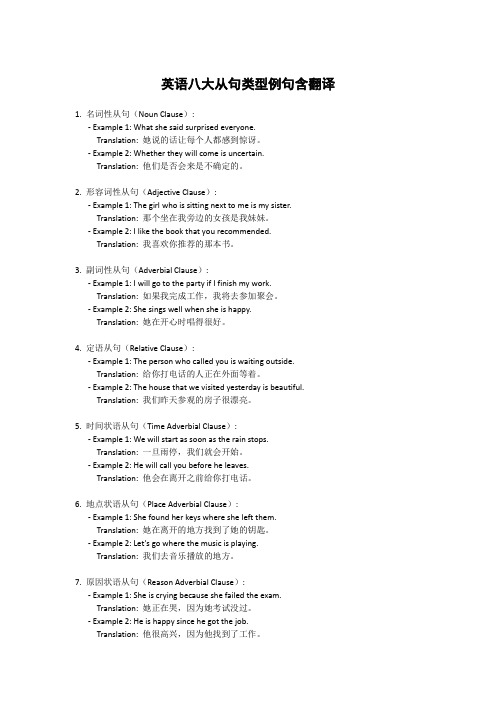
英语八大从句类型例句含翻译1. 名词性从句(Noun Clause):- Example 1: What she said surprised everyone.Translation: 她说的话让每个人都感到惊讶。
- Example 2: Whether they will come is uncertain.Translation: 他们是否会来是不确定的。
2. 形容词性从句(Adjective Clause):- Example 1: The girl who is sitting next to me is my sister.Translation: 那个坐在我旁边的女孩是我妹妹。
- Example 2: I like the book that you recommended.Translation: 我喜欢你推荐的那本书。
3. 副词性从句(Adverbial Clause):- Example 1: I will go to the party if I finish my work.Translation: 如果我完成工作,我将去参加聚会。
- Example 2: She sings well when she is happy.Translation: 她在开心时唱得很好。
4. 定语从句(Relative Clause):- Example 1: The person who called you is waiting outside.Translation: 给你打电话的人正在外面等着。
- Example 2: The house that we visited yesterday is beautiful.Translation: 我们昨天参观的房子很漂亮。
5. 时间状语从句(Time Adverbial Clause):- Example 1: We will start as soon as the rain stops.Translation: 一旦雨停,我们就会开始。
4名词性从句的翻译
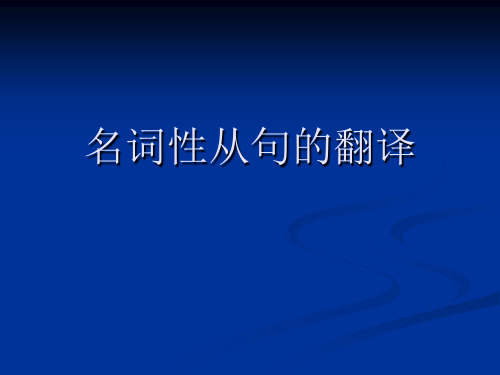
When we can begin the expedition is still a question.
How he is going to do it is a mystery.
(二)用it作形式主语的主语
1997-72
三、表语从句
It seems that it is going to snow. That is why Jack got scolded. The question remains whether we
can win the majority of the people. His view of the press was that the
reporters were either for him or against him.
2002-61
四、同位语从句
belief(相信),fact(事实),hope(希 望), idea(想法,观点),doubt(怀 疑),news(新闻,消息),rumor(传 闻),conclusion(结论),evidence(证 据),suggestion(建议),problem(问 题),order(命令),answer(回答), decision(决定),discovery(发现), explanation(解释),information(消 息),knowledge(知识),law(法律), opinion(意见,观点),truth(真理,事 实),promise(承诺),report(报告), thought(思想),statement(声明), rule(规定),possibility(可能)
I heard it said that he had gone abroad.
名词性从句翻译
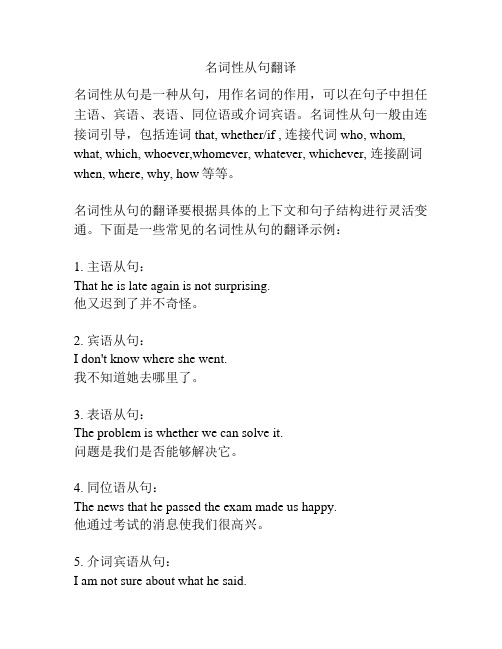
名词性从句翻译名词性从句是一种从句,用作名词的作用,可以在句子中担任主语、宾语、表语、同位语或介词宾语。
名词性从句一般由连接词引导,包括连词that, whether/if , 连接代词who, whom, what, which, whoever,whomever, whatever, whichever, 连接副词when, where, why, how等等。
名词性从句的翻译要根据具体的上下文和句子结构进行灵活变通。
下面是一些常见的名词性从句的翻译示例:1. 主语从句:That he is late again is not surprising.他又迟到了并不奇怪。
2. 宾语从句:I don't know where she went.我不知道她去哪里了。
3. 表语从句:The problem is whether we can solve it.问题是我们是否能够解决它。
4. 同位语从句:The news that he passed the exam made us happy.他通过考试的消息使我们很高兴。
5. 介词宾语从句:I am not sure about what he said.我不确定他说的是什么。
6. 间接引导名词性从句:He asked where I lived.他问我住在哪里。
7. 是否从句:I wonder whether/if she will come to the party.我想知道她是否会来参加派对。
8. 选择性从句:He asked me whether I preferred coffee or tea.他问我是喜欢咖啡还是茶。
9. 宾语从句(陈述句变为疑问句):Do you know what time it is?你知道现在几点钟吗?10. 宾语从句(连接代词):I wonder who is going to pick us up at the airport.我想知道谁会在机场接我们。
课件10 名词性从句的翻译

3) 加入冒号、破折号和 “这样”、“这一”、“即”等字眼
But
considering realistically, we had to face the fact that our prospects were less than good. 但在实事求是地考虑一番之后,我们不得不正 视这样一个事实:我们的前景并不妙。 Influenced by these ethics, the new generation live under the delusion that money does not stink. 受这种道德观念的影响,青年一代生活在这样 一种错觉中,以为金钱总是香喷喷的。
Most
remarkable of all is the fact that each question was decidedly consensus, thus enhancing prospects that the treaty will win approval when it comes up for ratification.
7
宾语从句
以that,
what, how引导的 宾语从句 句
以it作形式宾语的宾语从
1) 以that, what, how引导的宾语从句
一般按原句顺序翻译
I
told him that I had to turn him down. 我告诉他我不得不拒绝他。 Did you hear what I said? 你没听见我的话吗? I told him how appealing I found the offer. 我告诉他,这个机会对我有着多么大的吸引 力。
2) 译为类似定语的结构或独立句
第12章名词性从句的翻译ppt课件
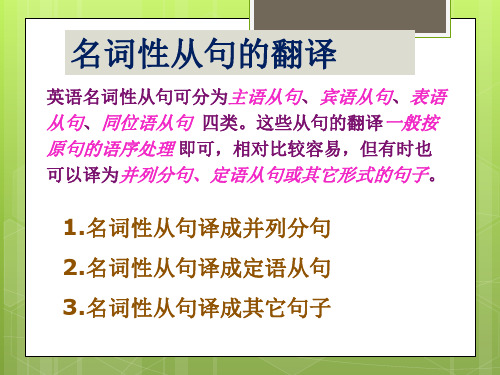
Not long ago the scientists made an exciting discovery that this “waste” material could be turned into plastics. (同位语从句)
名词性从句的翻译
英语名词性从句可分为主语从句、宾语从句、表语 从句、同位语从句 四类。这些从句的翻译一般按 原句的语序处理 即可,相对比较容易,但有时也 可以译为并列分句、定语从句或其它形式的句子。
1.名词性从句译成并列分句 2.名词性从句译成定语从句 3.名词性从句译成其它句子
1.译成并列分句
如果名词性从句包含两层以上的意思,需要把主句与从句 分开译。一般先译出从句,放在句首,然后用汉语的复指 代词“这”“那”,与主句的其他成分连成一句。同位语 从句的翻译与定语从句的翻译非常近似,可以将同位语从 句放在名词前,相当于前置的修饰语,但不必使用定语的 标志“的”字;可以保持原句的语序,译为后置的并列句, 加入冒号、破折号或“这样”、“这…”、“那就是”、 “即”等字眼;也可以改变原句的同位语结构,采用汉语 的无主句或其它方式的译法。
(宾语从句) 如果没有城市的支持, 简直难以想象会有大学、医院和大 企业, 甚至连科学技术也不会有。
4.We fail to learn that pain is the body's way of in-
forming the mind that we are doing something wrong, not necessarily that something is wrong.
- 1、下载文档前请自行甄别文档内容的完整性,平台不提供额外的编辑、内容补充、找答案等附加服务。
- 2、"仅部分预览"的文档,不可在线预览部分如存在完整性等问题,可反馈申请退款(可完整预览的文档不适用该条件!)。
- 3、如文档侵犯您的权益,请联系客服反馈,我们会尽快为您处理(人工客服工作时间:9:00-18:30)。
Have you decided whom you are to nominate as your candidate?
你是否已决定提名谁当候选人了?
That is where you are wrong. 这正是你错的地方。 We had to face the fact that our prospects were less than good. 我们不得不正视这样的事实:我们的前景并 不妙。
III.同位语从句的翻译
同位语从句主要是用来对名词作进一步的解释,说明名 词的具体内容。能接同位语从句的名词主要有:belief (相信),fact(事实),hope(希望), idea(想法, 观点),doubt(怀疑),news(新闻,消息), rumor(传闻),conclusion(结论),evidence(证 据),suggestion(建议),problem(问题),order (命令),answer(回答),decision(决定), discovery(发现),explanation(解释), information(消息),knowledge(知识),law(法 律),opinion(意见,观点),truth(真理,事实), promise(承诺),report(报告),thought(思想), statement(声明),rule(规定),possibility(可能) 等。
C.英语中有时为了修辞强调, 把宾语从句置于 主句前,汉译时 也可遵从该修辞效果,顺序译 出。如: 24. Whether they like it or not, I don’t care. 他们喜不喜欢,我可不管。 25. What they were asked to do in 10 days, they finished in two. 让他们是天做的事,他们两天就做完了。
II.宾语从句的译法
A 普通句型 以从属连词、连接代词或介词引起的宾语从句汉译时, 词序一般不变。如: I have not made up my mind as to what elective course I am to take next term. --我还有决定下学期上哪些选修课。 This shows that something unexpected may have turned up. --这表明可能出现了意外情况。 Lei Feng always thought how he could do more for people. --雷锋总是想到怎样为人民做更多的事。 She was never satisfied with what she had achieved. --她从不满足于她取得的成就。 Zhang San replied that he was very sorry. --张三回答说,他感到很遗憾。
D 作适当扩充或加破折号、冒号 Her son, my employer’s nephew, was himself an assistant in the shop. 她的儿子,也就是我老板的侄子,也在店里 当伙计。 But in three hours we reached our destination, A prison. 但三小时之后我们就到了目的地——A监狱。
B 有时候在翻译同位语从句时,可以将其放在所 修饰的名词前面,相当于前置的修饰语,但不一 定使用定语的标志词“的”。这种情况下,同位 语从句都是比较简单。 We know the fact that bodies possess weight. 我们都知道物体具有重量这一事实。 The rumor that he was arrested was unfounded. 关于他被捕的传闻是没有根据的。
4. It is quite possible that someday John will come to see you again. --总有一天约翰会来找你的,这是很有可能 的哦! 5.It is frequently the case that his car breaks down on the highway. --他的车在路上抛锚,这是常有的事儿。 6. It is a matter of common experience that bodies are lighter in water than they are in air. --物体在水中比在空气中轻,这是一种(大 家共有的)常识。
名词性从句的翻译
英语名词性从句包括主语从句、宾语从句、 表语从句和同位语从句。在翻译时,词序 一般不变,但有时也需采取一些其他处理 方法。
I. 主语从句的译法
A.“It+被动语态+that”句型 这种句型通常要译成汉语里的主动句,并增译出“大家”“我们” “有人” “人们”等泛指性的主语。该译法的特点保留了原文句子结 构的前后顺序,即:先主句,后从句。有时也可译为“据……”的句 型。如: 1. It is reported that the Summit Meeting will be held in December. --据报道,这个峰会将在12月举行。 2. It could be argued that the radio performs this service just as well; but on television everything is much more living, much more real. --可能有人会提出,无线电广播同样能够做到这一点;但是在 电视屏幕上,每个节目都显得更加生动,更加真实。 3. It is well known that alloy is a metal product containing two or more elements. --众所周知(大家都知道),合金是一种含有两种或两种以上 元素的金属产品。
比较上述各句,联系英汉民族思维差异:英语民族重直线思维, 要点先给出,其他信息再一一增补;汉语民族重曲线思维,先侧 面,外围,后点出信息的重点。因而,英语(前重心)是头短尾 长,汉语是(后重心),头大尾小。 C. 有what, whatever, whoever, when, whether等引导出的主 语从句通常可按正常语序译出。如: 1. What is hard is to do good all one’s life and never do anything bad. --难得的是一辈子做好事而不做坏事。 2. What the students find most difficult in English is its idiomatic usage. --学生感到, 英语最困难的地方是它的习惯用法 3. Whatever was said here must be kept secret. --这里说的每句话都应当保密。 4. Who will monitor the class is not decided yet. --谁当班长还没决定。 5. When her parents will come hasn’t been under consideration. --她的父母什么时候到来还没有(纳入)考虑。
C 增加“即”(或者“以为”)这样的词来连接,或用 冒号、破折号直接分开主句和同位语从句。 But this does not in any way alter the fact that they are now, from a practical point of view, irrational. 但这却丝毫改变不了这样一个事实,即从实用的观 点来看,他们今天仍是不合理的。 We have reached the conclusion that practice is the criterion for testing truth. 我们已经得出这样的结论:实践是检验真理的标准。 Not long ago, the scientists made an exciting discovery that this waste material could be turned into plastics. 不久前,科学家们获得一个令人振奋的发现——可 以把这种废物变成塑料。
IV表语从句
英语中的表语从句放在连系动词后面,充当表语成分, 一般可以按照英语原文顺序直接翻译。 It seems that it is going to snow. 看起来要下雪了。 That is why Jack got scolded. 这就是杰克受到训斥的原因。 The question remains whether we can win the majority of the people. 问题是我们能否赢得大多数人民群众的支持。 His view of the press was that the reporters were either for him or against him. 他对新闻界的看法是,记者们不是支持他,就是反 对他。
B. “It +谓语(表语)+that”句型 这样的主语从句句型可处理为: (1) 先把主句的谓语或表语部 分译成独立语,然后顺译出从句;(2) 颠倒原文句子结构,先译 出从句,再译出主句。如: 1. It is strange that she has failed to see his advantages. --真奇怪,她竟然没有看出他的优点。 2. It goes without saying that plants cannot grow without sunshine. --毋庸置疑,没有阳光,植物就不能生长。 3. It is quite obvious that the girl still loves you deeply. --很明显,这个女孩依然深爱着你。 4. It follows that the Chinese comrades consider Korea’s cause as their own. ? --由此得出,中国同志把朝鲜的事情看成自己的事情。
